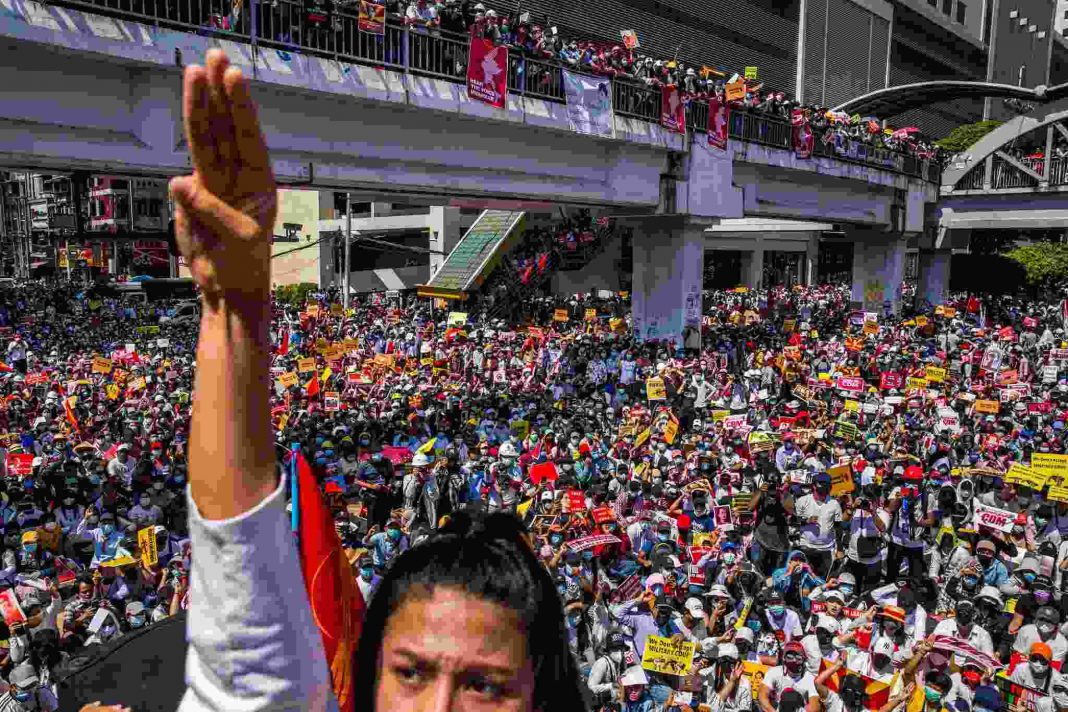In the days following the military’s seizure of power in Myanmar on February 1, 2011, millions of people took to the streets to demonstrate their opposition to the coup, walking off their jobs in what has become a long-lasting nationwide civil disobedience movement and standing up to the junta’s murderous violence.
As of the beginning of this year, the Southeast Asian nation is engulfed in conflict, its economy has been wrecked, fighting has spread across the country, and governmental institutions are in a state of disarray. Soldiers have shot and murdered peaceful protestors. Suspects have been tortured, and hundreds of citizens have died as a result of the violence.
Activists have called for a “silent strike” on Tuesday to commemorate the anniversary of the coup, encouraging people to remain at home, stop their businesses, and refrain from engaging in outside activities for six hours. The junta distributed pamphlets informing attendees that they would be prosecuted with terrorism, provocation, and breaching the electronic communications legislation if they took part in the demonstration. Hundreds of people have already been detained.
The dictatorship has stoked such anti-government sentiment that it has been unable to consolidate power. Armed rebel formations have popped up around the nation, and a shadow National Unity Government, led in part by expelled elected officials, has been created to assist in leading the resistance to the junta.
As part of the coup, the military detained more than 100 elected politicians, including Daw Aung San Suu Kyi, the country’s senior civilian leader, who was 76 at the time of the arrest. She might be sentenced to as many as 173 years in jail if convicted on 17 counts that her supporters claim are fabricated. So far, she has been found guilty on five separate charges.
Nonetheless, Senior Gen. Min Aung Hlaing, the army’s commander in chief and the coup’s leader, seems to have miscalculated the level of popular disdain for him and his generals, who have reacted with a ruthless assault on the opposition.
According to the United Nations Human Rights Office, at least 1,500 citizens have been slain by junta troops, many of whom were targeted during peaceful rallies or during raids on homes and businesses. According to the Human Rights Office, about a fifth of the fatalities — at least 290 — happened while the victims were in prison, and many of these deaths were as a consequence of torture.
President Biden issued a statement on Monday in which he decried the regime’s “unspeakable cruelty against civilians, especially children,” as well as its denial of humanitarian access to millions of people who are in desperate need of lifesaving assistance.
Speaking to the people of Myanmar, Vice President Biden said, “We have not forgotten your suffering.” As well, we will continue to assist you in your brave efforts to establish democracy and the rule of law in your land.”
For decades, the Myanmar military has fought against a diverse range of ethnic groups, but it has never been able to establish total control over the country’s northern frontier. At this point, combat has spread to every corner of the nation, and in certain locations, freshly established anti-regime formations are fighting alongside ethnic militias.
A former United Nations Special Rapporteur on Myanmar, Yanghee Lee, described the military’s overthrow of the civilian administration as a “failed coup” since the dictatorship was unable to consolidate power after taking control of the country. She described what is taking on in the country right now as a “nationwide democratic revolution.”
As a result of the military’s attacks on civilian targets in the countryside, more than 400,000 people have been forced from their homes. Approximately 150,000 children are said to have been displaced, with many of them living in temporary shelters in the forest, where they are susceptible to hunger and sickness, according to the international charity organisation Save the Children.
In the Kayah State, where almost 200,000 people were forced to evacuate their homes, some of the regime’s most horrific atrocities have been carried out. The capital city of Loikaw, which was mainly uninhabited, was a ghost town. On Christmas Eve, troops killed and torched at least 35 fleeing citizens in their trucks, according to eyewitnesses. Two members of the Save the Children crew were among those who died.
Pro-democracy demonstrators appealed for assistance from the international community in the weeks after the military takeover. “R2P,” or “Obligation to Protect,” was written on several of the placards, alluding to a 2005 United States concept emphasising the responsibility of nations to shelter communities from heinous atrocities.
In an appeal to the international community, human rights organisations have asked it to shut off the supply of armaments to the military, stop the flow of funds to the government, and put an end to the junta’s impunity by bringing the generals before the International Criminal Court.
In January, the oil giants Chevron and Total bowed to public pressure and announced intentions to withdraw from a natural gas field off the coast of Myanmar, which had been a key source of revenue for the dictatorship for years. Sanctions on military officials imposed by the United States, on the other hand, have not proven to be a substantial deterrent.
As a result of the latest sanctions, the United Kingdom, Canada, and the United States have imposed further restrictions on key judicial officials and other persons who assist the junta in supplying weapons, including U Jonathan Kyaw Thaung, who is the scion of a major business family.

